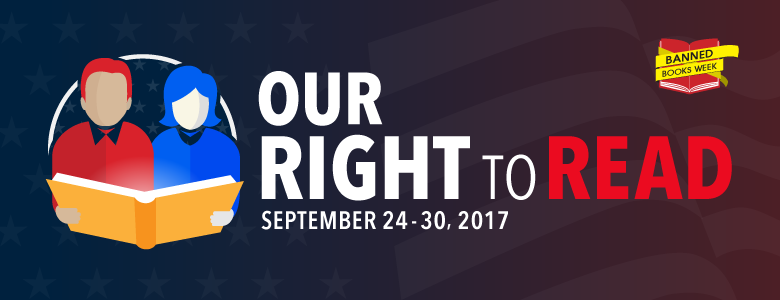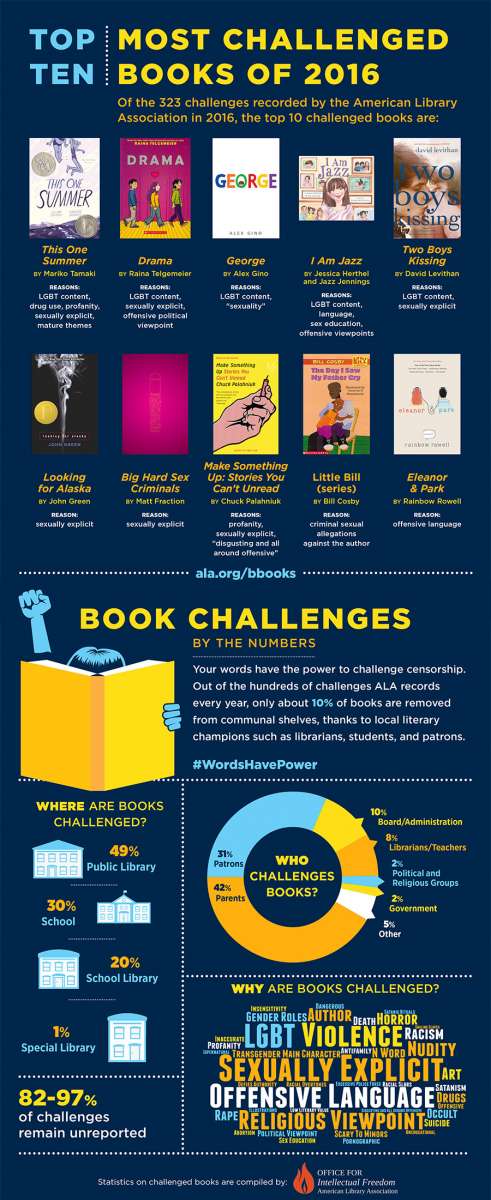Booksellers and librarians across the country are planning, constructing, straightening, and promoting their displays of challenged books in preparation for the “celebration” of Banned Books Week beginning just a few days from now. If you’re like THIS bookseller, and are still stacking the apple-picking books and hanging autumn leaves from the light fixtures with fishing line, you are madly, frantically clearing space, pulling backlist titles from the shelves, and looking for ideas beyond the tired “WARNING” police tape and construction paper flames. A very clever librarian used the heading “BOOKS THEY DON’T WANT YOU TO READ”, and I think that’s the theme we’re borrowing this year.

A few sobering facts from the infographic produced by the American Library Association clarify the need for this designated week to think and talk about reading freedoms, and helped me to pull up my socks and get to work. Some of the top 10 most challenged books of 2016 are some of the books that moved me the most in the last few years, and are titles that I have pressed into the hands of kids and sometimes skeptical parents.
Startlingly, however, the majority of the challenges to these and other books came from the broad demographics of my own customer base: parents, teachers, administrators and school board members. I can identify all these roles in my top 100 customer list, and market directly to them, relying on our relationship and their continued goodwill. These are the very credit cards and purchase orders that my business relies upon to survive, and yet these titles are among those I have passionately described and recommended—where, then, is the disconnect between my reality and the continued, escalating need for this conversation about the right to read in our country?
I live and work in an arguably politically conservative state, and own a business in a well-to-do, highly educated county. The small left-hand corner statistic on the infographic below (while difficult to validate, but certainly plausible) indicates that a much larger number of the complaints, challenges and restrictions placed against these and other titles are never reported, making this issue almost incomprehensible in size and scope. Are there quiet decisions made to omit titles from reading lists in my neighborhood schools for fear of backlash? Are there books not purchased in my store, not displayed, or not chosen for book clubs because of a perceived negative response from some small group? Am I, as a community bookseller and gateway to literacy, unwittingly participating in that censorship by allowing my selection to be directed not just by literary quality, but an underlying sense of “community norms” which limit my purchases, and therefore my store’s selection?
Ahhhh…. here’s the really hard work in preparing for Banned Books Week. It is not enough, in my opinion, to make lists of challenges and protests against titles that occur in other places. First, we must look to our own shelves, our conversations during sales appointments and Edelweiss markups, and perhaps to the gaps between our TBR piles and our shelf talkers. When we talk about what makes an independent bookstore special, the term “curation” almost always appears. We are good at what we do—selling books—because we read, we choose, we commit to an inventory that we believe offers the very best of the current and past seasons. Shelf space, open-to-buy formulas, and sheer force of will compete for every precious inch in our stores. We can’t afford everything, nor do we want to carry it. Some of us allow our buying to be driven by the age of our readers (do you carry YA, or a more limited amount?) or by price (light on hardcover frontlist, heavier on paperback early readers and mass market?) or by simply limiting from personal taste. I would argue that the bookseller who only buys to please her own reading preferences will have a limited run in her business, but there is no question that we buy with what we believe we can hand-sell in mind. I also firmly commit to profitability. Bookselling may be a calling, but store ownership does not come with a sackcloth uniform, nor is poverty and debt a part of my list of business goals. I need to sell what I buy, they need to buy what I sell. Ideally, that happens in season, without markdown, and preferably in hardcover.
When we talk about what makes an independent bookstore special, the term “curation” almost always appears. We are good at what we do—selling books—because we read, we choose, we commit to an inventory that we believe offers the very best of the current and past seasons. Shelf space, open-to-buy formulas, and sheer force of will compete for every precious inch in our stores. We can’t afford everything, nor do we want to carry it. Some of us allow our buying to be driven by the age of our readers (do you carry YA, or a more limited amount?) or by price (light on hardcover frontlist, heavier on paperback early readers and mass market?) or by simply limiting from personal taste. I would argue that the bookseller who only buys to please her own reading preferences will have a limited run in her business, but there is no question that we buy with what we believe we can hand-sell in mind. I also firmly commit to profitability. Bookselling may be a calling, but store ownership does not come with a sackcloth uniform, nor is poverty and debt a part of my list of business goals. I need to sell what I buy, they need to buy what I sell. Ideally, that happens in season, without markdown, and preferably in hardcover.
There is a self-fulfilling prophecy at work here: we buy what we like and are comfortable with, we sell it well, we attract customers who like our selection, and so it goes, happily ever after. But where is the hidden treasure in that cave, guarded by the dragon of our personal reading list, or cloaked in the mist of our perceived sales projections? Where is the new, the different, the outside? Where do we build a bridge to those in our communities who want to read differently, and how do we entice them to cross it? And when books representing all members of our community appear on school reading lists, in local libraries, and in curriculum, are they rejected as strange or wrong partly because they have not had commercial support? Do our bookstore shelves reflect a limited view of our world because we have created that world within our stores, and do we perpetuate that climate by catering only to that smaller view?
It is easy to pull “banned books,” to make a display for a week, and to cluck our tongues at the misguided or the closed-minded or the poorly read who object to titles in faraway states or communities that do not reflect our image of our own. But do we apply the same level of open-mindedness that we wish they possessed to each of our sections, and offer each customer access to all the gold and wealth hidden in our treasure chest of books?
